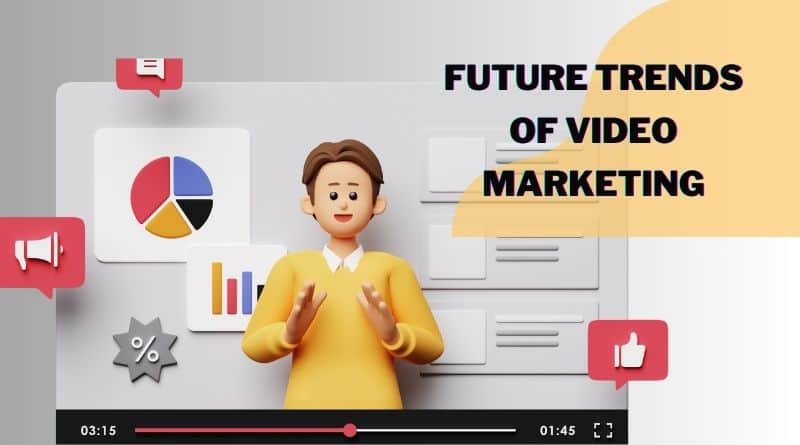The Future of Video Marketing
Introduction: Future of Video Marketing
In the fast-paced world of digital marketing, staying ahead of the curve is essential to engage and captivate audiences effectively. Over the past decade, video marketing has emerged as a powerhouse in the marketing realm, transforming the way brands connect with their target audience.
As we step into the future, the landscape of video marketing is poised for even more significant growth and innovation. In this article, we will explore the future of video marketing and how it will continue to evolve and shape the marketing landscape.
The Current State of Video Marketing:
Before we delve into the future, it’s essential to understand where video marketing stands today. Video content is already a dominant force, with platforms like YouTube, TikTok, and Instagram’s IGTV providing fertile ground for brands to engage with consumers. Statistically, video content is expected to account for an overwhelming majority of global internet traffic in the coming years.
Moreover, the rise of live streaming and the adoption of video across various social media platforms have reshaped consumer expectations. Short-form video content, such as TikTok and Instagram Reels, has gained immense popularity, enabling brands to convey their messages in quick, engaging formats.

The Future Trends of Video Marketing:
1. Interactive Videos:
One of the most exciting developments in video marketing is the rise of interactive videos. These videos allow viewers to actively participate in the content by making choices or interacting with elements within the video. This level of engagement can significantly boost user retention and conversion rates. Imagine interactive product demonstrations or choose-your-own-adventure style storytelling. It’s a game-changer.
2. Personalization and AI:
The future of video marketing is personalized. With the help of Artificial Intelligence (AI) and Machine Learning (ML), brands will create highly tailored video content that speaks directly to individual viewers. These videos will take into account user preferences, behaviors, and past interactions with the brand. Personalization will not only enhance engagement but also boost conversion rates.
3. 360-Degree and Virtual Reality (VR):
Immersive experiences are the future of video marketing. 360-degree videos and VR content will transport viewers into a brand’s world, providing an unparalleled level of engagement. For instance, real estate companies can offer virtual property tours, and travel agencies can showcase exotic destinations, all in immersive 360-degree videos.
4. Shoppable Videos:
E-commerce and video marketing will merge seamlessly through shoppable videos. Viewers will be able to make purchases directly from the video, eliminating the need to navigate to a separate website. This streamlined shopping experience will lead to higher conversion rates and an improved customer journey.
5. User-Generated Content:
User-generated content (UGC) will continue to play a significant role in video marketing. Brands will encourage customers to create and share their own videos related to the products or services, fostering authenticity and trust. UGC not only humanizes the brand but also expands its reach.
6. Short-Form Video Dominance:
Short-form videos will remain a vital part of video marketing. Attention spans are decreasing, and brands will need to create concise and engaging content to capture their audience’s interest quickly. Platforms like TikTok will continue to be a goldmine for reaching younger demographics.
7. Ephemeral Content:
Stories on platforms like Instagram and Snapchat are ephemeral in nature, and they are here to stay. Brands will continue to use these formats to create a sense of urgency and FOMO (fear of missing out), driving immediate engagement and conversions.
8. Data-Driven Insights:
Advanced analytics tools will provide deeper insights into video performance. Marketers will use data to refine their video strategies continually, ensuring that each piece of content maximizes its impact.
Also, there are several social media automation tools in the market and how you can apply digital marketing to your startup business.

Challenges in the Future of Video Marketing:
While the future of video marketing holds immense promise, it also presents its fair share of challenges:
1. Content Saturation:
As more brands invest in video marketing, the competition for viewers’ attention intensifies. Cutting through the noise and delivering content that stands out will be a constant challenge.
2. Privacy Concerns:
With increased personalization, concerns about data privacy and consent will become more significant. Brands will need to strike a delicate balance between customization and respecting user privacy.
3. Technology Adaptation:
Embracing emerging technologies like AI, VR, and interactive videos requires investments in technology and training. Brands that fail to keep up may be left behind.
4. Measurement and ROI:
Measuring the ROI of video marketing efforts accurately can be challenging. Brands will need robust tracking and measurement tools to determine the real impact of their videos.
Conclusion
The future of video marketing is incredibly exciting and holds vast potential for brands willing to adapt and innovate. As technology continues to evolve, so will the ways in which we create and consume video content.
Brands that stay ahead of the curve, embrace emerging trends, and prioritize personalization and engagement will thrive in the ever-evolving world of video marketing.
The journey ahead promises to be dynamic, engaging, and filled with opportunities for those who dare to seize them. So, gear up and get ready to ride the wave of the future of video marketing.
Also, if you feel digital marketing is something that you can unaware of, then it would be best to learn more about it first.


